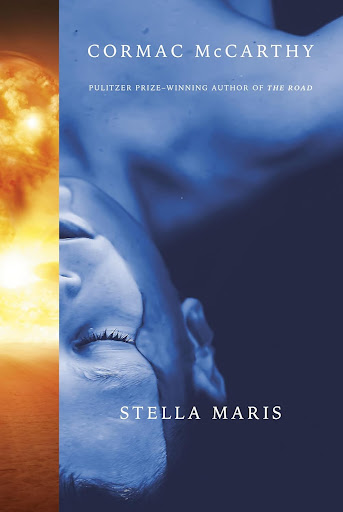Literary Fiction Annotation: Stella Maris
Title: Stella Maris
Genre: Literary Fiction
Publication Date: December 6, 2022
Number of Pages: 208
Geographical Setting: A psychiatric care facility (Stella Maris) in Black River Falls, Wisconsin
Time Period: 1972
Plot Summary:
Content warning: suicidal ideation, mental illness, incestuous relationships.
This is one of the most interesting books I've ever read. It is the second volume of a two-volume work (the first being The Passenger), and it was the final book McCarthy published before his death. I won't try to summarize the plots of both novels, because even though they are connected thematically and focus on the same characters, Stella Maris is its own distinct story. It is told entirely through dialogue, comprised of conversations between the protagonist, Alicia Western, and her psychiatrist. Alicia is a young mathematical and musical prodigy who is jaded and cynical about the meaning of life. She voluntarily checks herself into the Stella Maris psychiatric facility at the beginning of the story due to suicidal ideation. She experiences frequent hallucinations of strange characters that can probably be best described as circus performers, and the most important of these is referred to as "The Kid." The Kid is the only hallucination who speaks with Alicia, often spewing jokes and nonsense, sometimes discussing philosophy, sometimes directly addressing the grief and struggles she faces. To make things more complicated, she is in love with her twin brother Bobby (the main character in The Passenger) who is in a coma. As Alicia meets with her psychiatrist, they discuss her life, mathematics, grief and desire, and the purpose of existence.
Okay, chances are I have not made the book sound appealing, and it's true that the plot is extremely weird. But, in my opinion, it is absolutely worth reading. I got through it in two days (it's a surprisingly quick read considering the dense subject matter), and I was engrossed the whole time. Alicia is an incredibly interesting and sympathetic character. The psychiatrist is also complex and likable, and their conversations are thought-provoking and often quite moving.
I DO recommend reading The Passenger first, as it provides context for Stella Maris that adds a lot to a reader's understanding of the character.
Subject Headings:
- Literary Fiction
- Psychological
- Existential
- Family/Siblings
- Mathematics
- Suspense
Appeal:
- Character: Sympathetic, People with mental illness
- Pace: Fast-paced
- Writing Style: Jargon-filled, Well-crafted dialogue
- Tone: Thought-provoking, Suspenseful
Terms that best describe this book:
- Challenging
- Experimental
- Emotional
- Character study
Relevant Fiction Works and Authors:
- The Passenger by Cormac McCarthy
- The companion piece to Stella Maris, and the story of Alicia's brother Bobby. It is not told entirely through dialogue, and it includes many more characters and settings, but it is still quite unconventional in its structure.
- In the Distance by Hernán Diaz
- This is a literary western novel about a 19th-century Swedish immigrant to America. While the plot is obviously very different from Stella Maris, Diaz's writing style, tone, and western flare are comparable to McCarthy's and would resonate with McCarthy fans. It also includes a sibling relationship that is important to the story.
- The Drowning Girl by Caitlín R. Kiernan
- This novel also features a schizophrenic female protagonist, but it seems to have a much more accessible writing style than McCarthy's, as well as a stronger fantasy/paranormal element.
- The Waves by Virginia Woolf
- The Waves is also told almost entirely through dialogue and interior monologue, and explores themes of self and collective consciousness, all of which makes it seem likely to appeal to fans of Stella Maris.
- Reaping and Sowing (Récoltes et semailles) The Life of a Mathematician: Reflections and Bearing Witness by Alexander Grothendiek
- Grothendiek's theories of mathematics come up a lot in Stella Maris, tying into Alicia's thoughts about the nature of reality. Surely, not everyone is going to want more math in their lives, but for those who are interested in this element of the story, Grothendiek's book would be a fascinating read.
- Hallucinations by Oliver Sacks
- Sacks was a neurologist, and his book examines the experiences and stories of several of his patients who had hallucinations, in an effort to better understand the human brain. Hallucinations are a significant element of Stella Maris, and one which is likely to be interesting to a lot more readers, especially because Sacks wrote this book hoping to destigmatize mental illness and hallucinations in general.
- No One Cares About Crazy People: The Chaos and Heartbreak of Mental Health in America by Ron Powers
- This is basically an in-depth look at the history of mental health treatment, with a focus on the associated social injustices, myths, and harmful ideas/policies, as well as the story of Powers' two schizophrenic sons. It seems like an absolutely harrowing read and probably too heavy for me, but readers who are interested in mental illness and psychiatric treatment (like that explored in Stella Maris) would likely enjoy it a lot.


I think this book sounds very interesting! I'm a fan of psychological themes and things that make you think. I really love your nonfiction choices. They sound very thoughtful. Great work!
ReplyDelete